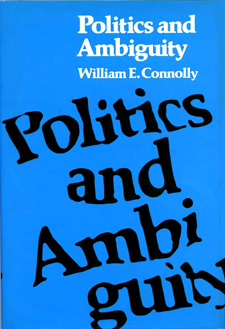Political Science
|
Politics and Ambiguity In a series of stimulating essays, William E. Connolly explores the element of ambiguity in politics. He argues that democratic politics in a modern society requires, if it is to flourish, an appreciation of the ambiguous character of the standards and principles we cherish the most. Connolly's work, lucidly, presented and intellectually challenging, will be of interest to students and scholars of political science, philosophy, rhetoric, and law, and to all whose interests include the connections between contemporary epistemological arguments and politics and, more broadly, between thought and language. Connolly criticizes the ways in which contemporary politics extends normalization into various areas of modern existence. He argues, against this trend, for an approach that would provide relief from the rigid identity formations that result from normalization. In supporting his thesis, Connolly shows how the imperative for growth must be relaxed if normalizing pressures are to be obviated. His, however, is not the familiar antigrowth argument; rather, he ties his thesis to his general antinormalization argument, asking how one could create an ethic that would sustain itself when the growth imperatives are relaxed. Connolly's chapters on the work of other thinkers (including Michel Foucault, Jürgen Habermas, Richard Rorty, and Charles Taylor) are linked with his main theme, as he shows how various tendencies in the philosophy of the social sciences and in political theory aid and abed the normalizing tendency. His analyses of Rorty and Taylor are especially important. Connolly shows the significance of antifoundationalism (Rorty's contribution to the debate on epistemology), while providing a compelling critique both of Rorty's stance and Taylor's alternative to it. Especially important to Connolly's thesis is the ontology on which it rests. He shows how the endorsement of an ontology of discordance within concord—a view that all systems of meaning impose order on that which was not designed to fit neatly within them—can support a more democratizing process. His final chapter, "Where the Word Breaks Off," vindicates the ontology of discordance, which has governed the argument throughout the text. Throughout these essays, Connolly builds a consistent argument for the politicalization of normalization, disclosing forms of normalization where others have seen unproblematic modes of communication and problem solving. Original in concept and bold in presentation, Connolly's work will form the basis for considerable debate in the several disciplines it serves. William E. Connolly is professor of political science at Johns Hopkins University and is editor of the journal Political Theory. He is the author of numerous articles and of several books, including The Terms of Political Discourse (Princeton University Press, 1983) and Appearance and Reality in Politics (Cambridge University Press, 1981).
Media & bookseller inquiries regarding review copies, events, and interviews can be directed to the publicity department at publicity@wwwtest.uwpress.wisc.edu or (608) 263-0734. (If you want to examine a book for possible course use, please see our Course Books page. If you want to examine a book for possible rights licensing, please see Rights & Permissions.)
|
181 pp. ISBN 0-299-10990-9 Cloth $27.95x ISBN 0-299-10994-1 Paper $19.95x Add titles to your shopping cart by clicking on the "Add this book to cart" link above. You
can submit your order electronically, paying for it with your credit card. Never
ordered from us before? |
|
|
If you have trouble accessing any page in this web site,
contact our Web manager. Updated September 6, 2010 © 2009, The Board of Regents of the University of Wisconsin System |
